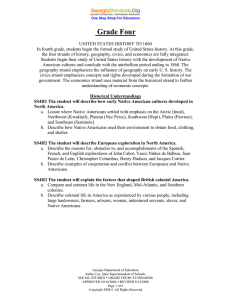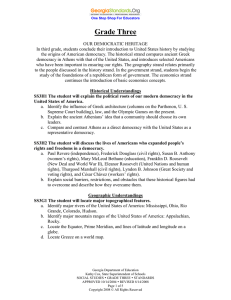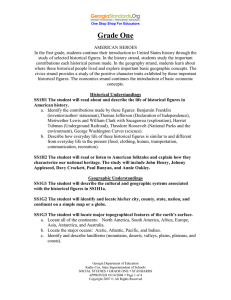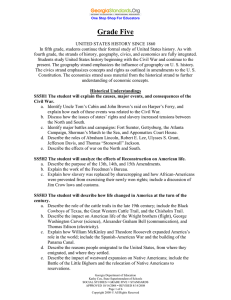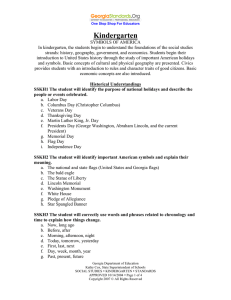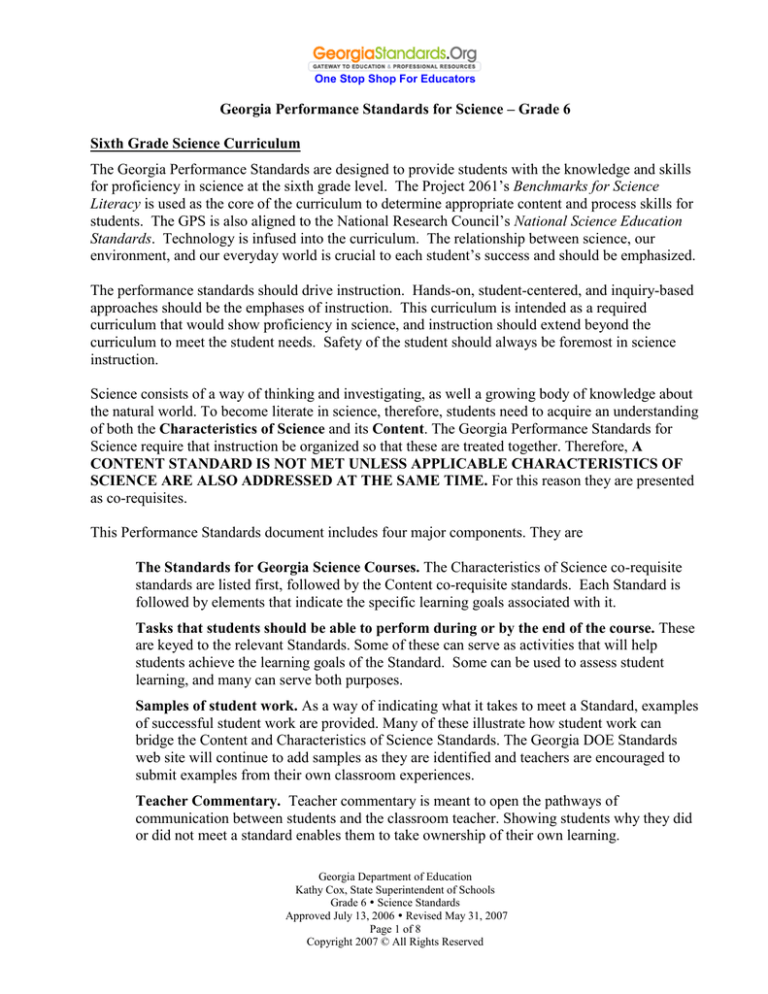
One Stop Shop For Educators
Georgia Performance Standards for Science – Grade 6
Sixth Grade Science Curriculum
The Georgia Performance Standards are designed to provide students with the knowledge and skills
for proficiency in science at the sixth grade level. The Project 2061’s Benchmarks for Science
Literacy is used as the core of the curriculum to determine appropriate content and process skills for
students. The GPS is also aligned to the National Research Council’s National Science Education
Standards. Technology is infused into the curriculum. The relationship between science, our
environment, and our everyday world is crucial to each student’s success and should be emphasized.
The performance standards should drive instruction. Hands-on, student-centered, and inquiry-based
approaches should be the emphases of instruction. This curriculum is intended as a required
curriculum that would show proficiency in science, and instruction should extend beyond the
curriculum to meet the student needs. Safety of the student should always be foremost in science
instruction.
Science consists of a way of thinking and investigating, as well a growing body of knowledge about
the natural world. To become literate in science, therefore, students need to acquire an understanding
of both the Characteristics of Science and its Content. The Georgia Performance Standards for
Science require that instruction be organized so that these are treated together. Therefore, A
CONTENT STANDARD IS NOT MET UNLESS APPLICABLE CHARACTERISTICS OF
SCIENCE ARE ALSO ADDRESSED AT THE SAME TIME. For this reason they are presented
as co-requisites.
This Performance Standards document includes four major components. They are
The Standards for Georgia Science Courses. The Characteristics of Science co-requisite
standards are listed first, followed by the Content co-requisite standards. Each Standard is
followed by elements that indicate the specific learning goals associated with it.
Tasks that students should be able to perform during or by the end of the course. These
are keyed to the relevant Standards. Some of these can serve as activities that will help
students achieve the learning goals of the Standard. Some can be used to assess student
learning, and many can serve both purposes.
Samples of student work. As a way of indicating what it takes to meet a Standard, examples
of successful student work are provided. Many of these illustrate how student work can
bridge the Content and Characteristics of Science Standards. The Georgia DOE Standards
web site will continue to add samples as they are identified and teachers are encouraged to
submit examples from their own classroom experiences.
Teacher Commentary. Teacher commentary is meant to open the pathways of
communication between students and the classroom teacher. Showing students why they did
or did not meet a standard enables them to take ownership of their own learning.
Georgia Department of Education
Kathy Cox, State Superintendent of Schools
Grade 6 Science Standards
Approved July 13, 2006 Revised May 31, 2007
Page 1 of 8
Copyright 2007 © All Rights Reserved
One Stop Shop For Educators
Georgia Performance Standards for Science – Grade 6
Georgia Performance Science Standards-- Explanation of Coding
Characteristics of Science Standards
SKCS1
Science Kindergarten Characteristics of Science Standard #1
S8CS2
Science Grade 8 Characteristics of Science Standard #2
SCSh8
Science Characteristics of Science high school Standard #8
Content Standards
S5P3
Science Grade 5 Physical Science Standard #3
S4E2
Science Grade 4 Earth Science Standard #2
S7L4
Science Grade 7 Life Science Standard #4
SC1
Science Chemistry Standard #1
SB4
Science Biology Standard #4
SPS6
Science Physical Science Standard #6
SP3
Science Physics Standard #3
Georgia Department of Education
Kathy Cox, State Superintendent of Schools
Grade 6 Science Standards
Approved July 13, 2006 Revised May 31, 2007
Page 2 of 8
Copyright 2007 © All Rights Reserved
One Stop Shop For Educators
Georgia Performance Standards for Science – Grade 6
Sixth grade students use records they keep and analyze the data they collect. They observe and
explain how an aspect of weather can affect a weather system. They use different models to
represent systems such as the solar system and the sun/moon/earth system. They use what they
observe about the earth’s materials to infer the processes and timelines that formed them. Sixth
graders write instructions, describe observations, and show information in graphical form. When
analyzing the data they collect, sixth graders can recognize relationships in simple charts and graphs
and find more than one way to interpret their findings. The students replicate investigations and
compare results to find similarities and differences.
The middle school earth science course is designed to give all students an overview of common
strands in earth science including, but not limited to, meteorology, geology, astronomy,
oceanography, resources, and human impact on the earth.
Major Concepts/Skills
Meteorology: Impact of weather and climate on the Earth
Oceanography
Earth Materials: Composition and structure of the Earth
Earth in Space
Interactions: Human impact on the Earth
Energy Sources
Concepts/Skills to Maintain
Characteristics of Science
Records investigations clearly and accurately
Uses scientific tools
Interprets graphs, tables, and charts
Writes clearly
Uses proper units
Organizes data into graphs, tables, and charts
Analyzes scientific data via calculations and
inference
Recognizes the importance of explaining data
with precision and accuracy
Uses models
Asks quality questions
Uses technology
Uses safety techniques
Co-Requisite – Characteristics of Science
Safety Techniques
Habits of Mind
S6CS1.
Students will explore the importance of curiosity, honesty, openness, and skepticism
in science and will exhibit these traits in their own efforts to understand how the
world works.
a. Understand the importance of—and keep—honest, clear, and accurate records in
science.
b. Understand that hypotheses are valuable if they lead to fruitful investigations, even if
the hypotheses turn out not to be completely accurate descriptions.
Georgia Department of Education
Kathy Cox, State Superintendent of Schools
Grade 6 Science Standards
Approved July 13, 2006 Revised May 31, 2007
Page 3 of 8
Copyright 2007 © All Rights Reserved
One Stop Shop For Educators
Georgia Performance Standards for Science – Grade 6
S6CS2.
Students will use standard safety practices for all classroom laboratory and field
investigations.
a. Follow correct procedures for use of scientific apparatus.
b. Demonstrate appropriate techniques in all laboratory situations.
c. Follow correct protocol for identifying and reporting safety problems and violations.
S6CS3.
Students will use computation and estimation skills necessary for analyzing data
and following scientific explanations.
a. Analyze scientific data by using, interpreting, and comparing numbers in several
equivalent forms, such as integers and decimals.
b. Use metric input units (such as seconds, meters, or grams per milliliter) of scientific
calculations to determine the proper unit for expressing the answer.
c. Address the relationship between accuracy and precision and the importance of each.
d. Draw conclusions based on analyzed data.
S6CS4.
Students will use tools and instruments for observing, measuring, and manipulating
equipment and materials in scientific activities.
a. Use appropriate technology to store and retrieve scientific information in topical,
alphabetical, numerical, and keyword files, and create simple files.
b. Estimate the effect of making a change in one part of a system on the system as a
whole.
c. Read analog and digital meters on instruments used to make direct measurements of
length, volume, weight, elapsed time, rates, and temperature, and choose appropriate
units for reporting various quantities.
S6CS5.
Students will use the ideas of system, model, change, and scale in exploring scientific
and technological matters.
a. Observe and explain how parts are related to other parts in systems such as weather
systems, solar systems, and ocean systems including how the output from one part of
a system (in the form of material, energy, or information) can become the input to
other parts. (For example: El Nino’s effect on weather)
b. Identify several different models (such as physical replicas, pictures, and analogies)
that could be used to represent the same thing, and evaluate their usefulness, taking
into account such things as the model’s purpose and complexity.
S6CS6.
Students will communicate scientific ideas and activities clearly.
a. Write clear, step-by-step instructions for conducting scientific investigations,
operating a piece of equipment, or following a procedure.
b. Understand and describe how writing for scientific purposes is different than writing
for literary purposes.
c. Organize scientific information using appropriate tables, charts, and graphs, and
identify relationships they reveal.
Georgia Department of Education
Kathy Cox, State Superintendent of Schools
Grade 6 Science Standards
Approved July 13, 2006 Revised May 31, 2007
Page 4 of 8
Copyright 2007 © All Rights Reserved
One Stop Shop For Educators
Georgia Performance Standards for Science – Grade 6
S6CS7.
Students will question scientific claims and arguments effectively.
a. Question claims based on vague attributions (such as “Leading doctors say...”) or on
statements made by people outside the area of their particular expertise.
b. Recognize that there may be more than one way to interpret a given set of findings.
The Nature of Science
S6CS8. Students will investigate the characteristics of scientific knowledge and how it is
achieved.
Students will apply the following to scientific concepts:
a. When similar investigations give different results, the scientific challenge is to judge
whether the differences are trivial or significant, which often requires further study.
Even with similar results, scientists may wait until an investigation has been repeated
many times before accepting the results as meaningful.
b. When new experimental results are inconsistent with an existing, well-established
theory, scientists may require further experimentation to decide whether the results
are flawed or the theory requires modification.
c. As prevailing theories are challenged by new information, scientific knowledge may
change and grow.
S6CS9. Students will investigate the features of the process of scientific inquiry.
Students will apply the following to inquiry learning practices:
a. Scientific investigations are conducted for different reasons. They usually involve
collecting evidence, reasoning, devising hypotheses, and formulating explanations.
b. Scientists often collaborate to design research. To prevent bias, scientists conduct
independent studies of the same questions.
c. Accurate record keeping, data sharing, and replication of results are essential for
maintaining an investigator’s credibility with other scientists and society.
d. Scientists use technology and mathematics to enhance the process of scientific
inquiry.
e. The ethics of science require that special care must be taken and used for human
subjects and animals in scientific research. Scientists must adhere to the appropriate
rules and guidelines when conducting research.
Georgia Department of Education
Kathy Cox, State Superintendent of Schools
Grade 6 Science Standards
Approved July 13, 2006 Revised May 31, 2007
Page 5 of 8
Copyright 2007 © All Rights Reserved
One Stop Shop For Educators
Georgia Performance Standards for Science – Grade 6
Reading Standard Comment
After the elementary years, students are seriously engaged in reading for learning. This process
sweeps across all disciplinary domains, extending even to the area of personal learning. Students
encounter a variety of informational as well as fictional texts, and they experience text in all genres
and modes of discourse. In the study of various disciplines of learning (language arts, mathematics,
science, social studies), students must learn through reading the communities of discourse of each of
those disciplines. Each subject has its own specific vocabulary, and for students to excel in all
subjects, they must learn the specific vocabulary of those subject areas in context.
Beginning with the middle grades years, students begin to self-select reading materials based on
personal interests established through classroom learning. Students become curious about science,
mathematics, history, and literature as they form contexts for those subjects related to their personal
and classroom experiences. As students explore academic areas through reading, they develop
favorite subjects and become confident in their verbal discourse about those subjects.
Reading across curriculum content develops both academic and personal interests in students. As
students read, they develop both content and contextual vocabulary. They also build good habits for
reading, researching, and learning. The Reading Across the Curriculum standard focuses on the
academic and personal skills students acquire as they read in all areas of learning.
S6CS10.
Students will enhance reading in all curriculum areas by:
a. Reading in All Curriculum Areas
Read a minimum of 25 grade-level appropriate books per year from a variety of
subject disciplines and participate in discussions related to curricular learning in
all areas
Read both informational and fictional texts in a variety of genres and modes of
discourse
Read technical texts related to various subject areas
b. Discussing books
Discuss messages and themes from books in all subject areas.
Respond to a variety of texts in multiple modes of discourse.
Relate messages and themes from one subject area to messages and themes in
another area.
Evaluate the merit of texts in every subject discipline.
Examine author’s purpose in writing.
Recognize the features of disciplinary texts.
c. Building vocabulary knowledge
Demonstrate an understanding of contextual vocabulary in various subjects.
Use content vocabulary in writing and speaking.
Explore understanding of new words found in subject area texts.
Georgia Department of Education
Kathy Cox, State Superintendent of Schools
Grade 6 Science Standards
Approved July 13, 2006 Revised May 31, 2007
Page 6 of 8
Copyright 2007 © All Rights Reserved
One Stop Shop For Educators
Georgia Performance Standards for Science – Grade 6
d. Establishing context
Explore life experiences related to subject area content.
Discuss in both writing and speaking how certain words are subject area related.
Determine strategies for finding content and contextual meaning for unknown
words.
Co-Requisite-Content
S6E1. Students will explore current scientific views of the universe and how those views
evolved.
a. Relate the Nature of Science to the progression of basic historical scientific models
(geocentric, heliocentric) as they describe our solar system, and the Big Bang as it
describes the formation of the universe.
b. Describe the position of the solar system in the Milky Way galaxy and the universe.
c. Compare and contrast the planets in terms of
Size relative to the earth
Surface and atmospheric features
Relative distance from the sun
Ability to support life
d. Explain the motion of objects in the day/night sky in terms of relative position.
e. Explain that gravity is the force that governs the motion in the solar system.
f. Describe the characteristics of comets, asteroids, and meteors.
S6E2. Students will understand the effects of the relative positions of the earth, moon and sun.
a. Demonstrate the phases of the moon by showing the alignment of the earth, moon,
and sun.
b. Explain the alignment of the earth, moon, and sun during solar and lunar eclipses.
c. Relate the tilt of the earth to the distribution of sunlight throughout the year and its
effect on climate.
S6E3. Students will recognize the significant role of water in earth processes.
a. Explain that a large portion of the Earth’s surface is water, consisting of oceans,
rivers, lakes, underground water, and ice.
b. Relate various atmospheric conditions to stages of the water cycle.
c. Describe the composition, location, and subsurface topography of the world’s oceans.
d. Explain the causes of waves, currents, and tides.
S6E4. Students will understand how the distribution of land and oceans affects climate and
weather.
a. Demonstrate that land and water absorb and lose heat at different rates and explain
the resulting effects on weather patterns.
Georgia Department of Education
Kathy Cox, State Superintendent of Schools
Grade 6 Science Standards
Approved July 13, 2006 Revised May 31, 2007
Page 7 of 8
Copyright 2007 © All Rights Reserved
One Stop Shop For Educators
Georgia Performance Standards for Science – Grade 6
b. Relate unequal heating of land and water surfaces to form large global wind systems
and weather events such as tornados and thunderstorms.
c. Relate how moisture evaporating from the oceans affects the weather patterns and
weather events such as hurricanes.
S6E5. Students will investigate the scientific view of how the earth’s surface is formed.
a. Compare and contrast the Earth’s crust, mantle, and core including temperature,
density, and composition.
b. Investigate the contribution of minerals to rock composition.
c. Classify rocks by their process of formation.
d. Describe processes that change rocks and the surface of the earth.
e. Recognize that lithospheric plates constantly move and cause major geological events
on the earth’s surface.
f. Explain the effects of physical processes (plate tectonics, erosion, deposition,
volcanic eruption, gravity) on geological features including oceans (composition,
currents, and tides).
g. Describe how fossils show evidence of the changing surface and climate of the Earth.
h. Describe soil as consisting of weathered rocks and decomposed organic material.
i. Explain the effects of human activity on the erosion of the earth’s surface.
j. Describe methods for conserving natural resources such as water, soil, and air.
S6E6. Students will describe various sources of energy and with their uses and conservation.
a. Explain the role of the sun as the major source of energy and its relationship to wind
and water energy.
b. Identify renewable and nonrenewable resources.
Georgia Department of Education
Kathy Cox, State Superintendent of Schools
Grade 6 Science Standards
Approved July 13, 2006 Revised May 31, 2007
Page 8 of 8
Copyright 2007 © All Rights Reserved

